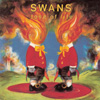Swans, "Love of Life"
 While Michael Gira certainly wrote many of his finest songs in the late '80s and early '90s, I was never able to embrace the "softer" phase of the Swans oeuvre as readily as I could the rest (a trait that is not uncommon). The main reason is that Gira's defining traits, for me, have always been his iconic intensity and his willingness to be bluntly honest and ugly. Such content was complemented perfectly by the Swans' early, more primal aesthetic, but the more traditionally melodic late-period material made things a bit more complicated.  I have no problem with the change in direction itself, but the central emphasis on melody and conventional rock structure often has a tendency to undercut or obscure the weightier themes in Gira's lyrics. Hearing Gira wrestle with that central conflict as he continues to expand his sound is what makes Love of Life both fascinating and frustrating.
While Michael Gira certainly wrote many of his finest songs in the late '80s and early '90s, I was never able to embrace the "softer" phase of the Swans oeuvre as readily as I could the rest (a trait that is not uncommon). The main reason is that Gira's defining traits, for me, have always been his iconic intensity and his willingness to be bluntly honest and ugly. Such content was complemented perfectly by the Swans' early, more primal aesthetic, but the more traditionally melodic late-period material made things a bit more complicated.  I have no problem with the change in direction itself, but the central emphasis on melody and conventional rock structure often has a tendency to undercut or obscure the weightier themes in Gira's lyrics. Hearing Gira wrestle with that central conflict as he continues to expand his sound is what makes Love of Life both fascinating and frustrating.
Many Swans fans view Love of Life's predecessor, White Light From the Mouth of Infinity, as one of the strongest albums of their career, but Love certainly has its share of enthusiastic champions as well.To my ears, this ambitious album is not quite as solid as White Light, but it definitely kept the band's momentum going while continuing to push the band's sound into new territory.I'd describe it as more of a lateral move rather than an improvement or a regression, balancing its less successful moments with a few great songs and one very important new thing: Jarboe's inspired incorporation of taped dialogue from her childhood.While Gira has always been a proponent of sampling, extended spoken-word narratives were a completely new element to the Swans sound.The use of tapes ultimately became one of the highlights of the band's 1996 masterpiece (Soundtracks for the Blind), but they were already wielded to perfection here with the untitled fifth song, a disturbingly matter-of-fact recording of Jarboe’s grandfather describing a hunting trip ("we took the heart out, it was practically torn in two.").There is a similarly striking interlude in "Her," where a 12-year old Jarboe discusses her plans to start a band with her wild friend Charlie.Lots of artists use samples, but Jarboe's tapes are personal, funny, and sad in a way that no one else has been able to replicate.
Aside from the important evolutionary steps towards tapes and droning instrumentals ("Identity"), Love of Life is also significant for having one brilliant song: the crunching, stomping, and overwhelming "In The Eyes of Nature." Gira attempts a similar fusion of melancholy and slow-motion heaviness with "The Golden Boy That Was Swallowed by the Sea," to slightly less success, losing me only with the somewhat bright choruses.I might be alone in my lukewarm praise of "Golden Boy" though, as I often see it hailed as one of the band's greatest successes.The two Jarboe-sung pieces are also excellent (if polarizing), but they just don't quite sound like they belong on the same album as the rest of the material here."She Cries (For Spider)," in particular, sounds like it would have been far more at home on a This Mortal Coil album than a Swans one (I like This Mortal Coil too though).Minor contextual grievances aside, however, "The Other Side of the World" is an achingly beautiful song.
The rest of the album is a mixed bag of very cool incidental pieces, digressions, missteps, and almost-successes.The bludgeoning quasi-industrial drums of"Amnesia" are noteworthy, simultaneously recalling Swans percussion-heavy past while anticipating many of the heavier moments on The Great Annihilator.It's also quite similar to some of Prong's better moments ("Irrelevant Thoughts," for example), which is no surprise given that 2/3 of Prong are on this album.It's nice to hear Gira snarl again once in a while.Some of the other aberrations don't fare quite as well though, particularly "The Sound of Freedom," which sounds like it could be a Pogues song played at quarter speed (until I read the lyrics, anyway).I am definitely not a fan of Gira flirting with major keys at all.
I also disliked the title song, which manages to derail some excellent drumming with its very repetitive and melodically dull vocals to exasperating effect.There's definitely a lot happening, but it is all in service of a very mediocre song.Usually Gira's laconic, deadpan vocals are a distinct asset, but they sometimes make his weaker moments sound a bit plodding.Also, sometimes the lines that give a Swans song some bite are not especially conspicuous, but I couldn't even find deeply buried bile in "Love of Life," only numbing variation of a very simple theme.
The fact that few Swans albums from this period are still in print is certainly unfortunate, but cutting Love of Life up for Various Failures does not strike me as an entirely terrible idea.It's certainly one of the more listenable and varied Swans albums, but it's also a bit uneven.Consequently, culling all of the highlights does not detract from the listening experience much at all for me: "In the Eyes of Nature" and the untitled hunting story are the only absolutely essential pieces here, but Failures even helpfully includes the entire second tier of good songs as well.The only real tragedy to Love of Life’s continued unavailability is that the cover art of Deryk Thomas was pretty spectacular.
Samples:




